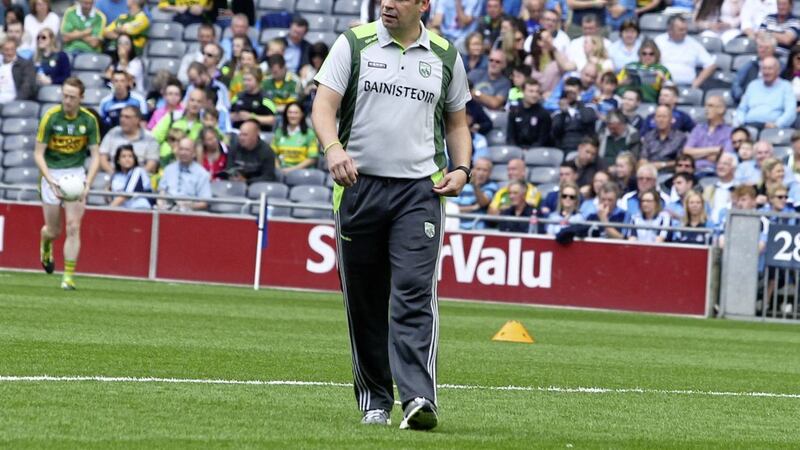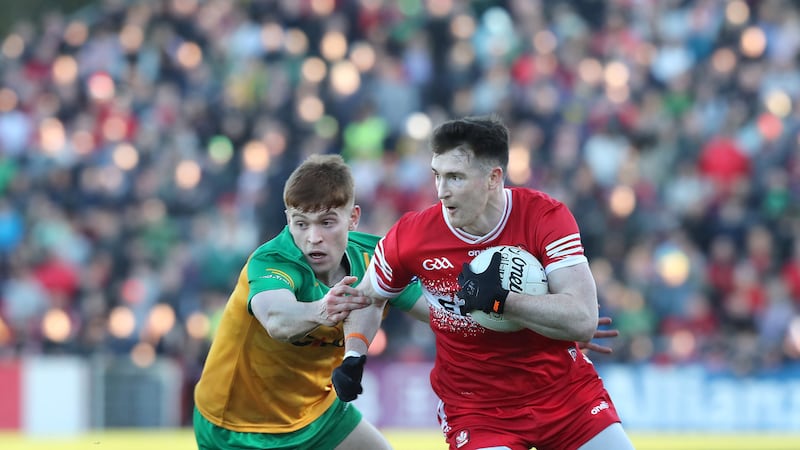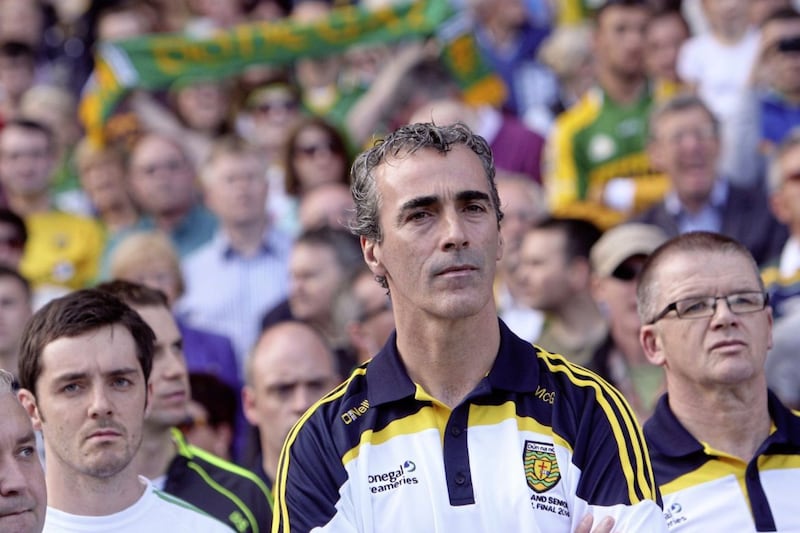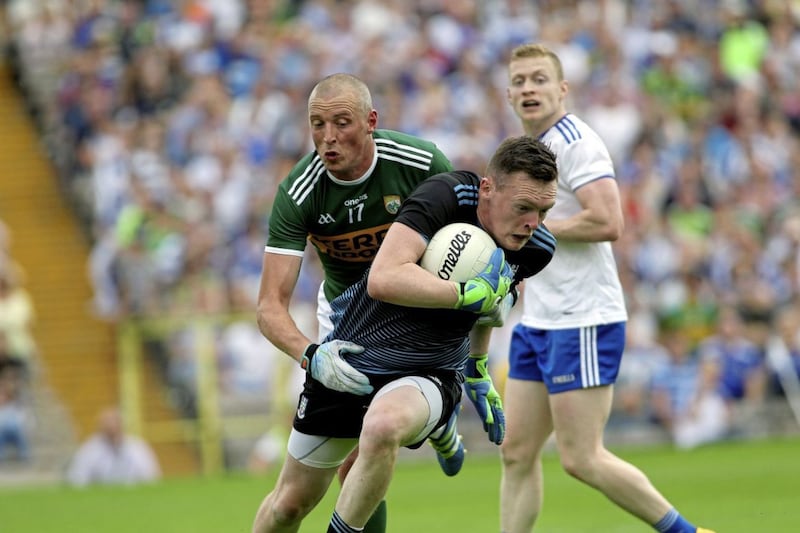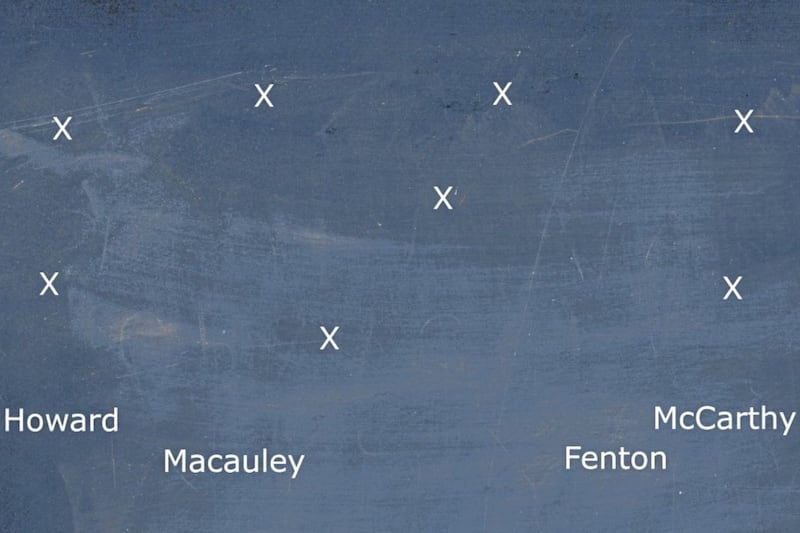BC: Were surprised with the retirements from last year’s Kerry squad?
EF: No, not really. I would have spoken to both Marc [O Se] and Aidan [O’Mahony] over the course of the winter. I think both of them took their time which is the right thing to do and they came to the same decision.
They were both fantastic servants for Kerry and I suppose age was catching up on them, they had a good innings and it was time to move on.
BC: In terms of Kieran Donaghy and Colm Cooper, what’s the latest on their futures?
EF: Kieran is back doing a bit of training with us. He’ll play very little football with us during the course of the League, maybe towards the end of the League [he’ll feature].
Colm is obviously with Dr Crokes at the moment so we’ll just let him at that, and when he’s finished up with that we’ll see where he’s at.
BC: How many times have you watched last year’s All-Ireland semi-final defeat to Dublin?
EF: [laughs] It would be in double digits now!
BC: Are you putting yourself through unnecessary pain watching it over again or is it a more forensic exercise now?
EF: I watched it when I came back from Dublin. The first two or three views of it, there’s a good bit of emotion involved. But after that you start processing what happened, where we fell down as a team and where we fell down as a management team and how we can improve for the coming season.
And it just becomes more of a forensic exercise I suppose. But the first couple of viewings there was a bit of hurt there.
BC: After the Dublin defeat you conducted yourself really well. From your point of view, what are those moments like facing the media particularly after such a gut-wrenching defeat?
EF: I suppose you have to compose yourself if you can. Like you said, it’s straight after a game and there is a bit of emotion there.
But, generally, I’d be a level enough person. I don’t get too carried away when we win and I don’t go to the depths when we lose.
I’d just be pragmatic enough about it. Absolutely, when you’re in front of the media so soon after the game, particularly a loss, it can be challenging.
BC: It’s the 73rd minute, Kerry are one point, Bryan Sheehan off-loads to Peter Crowley, and Crowley gets hit by Dublin’s Kevin McManamon. What’s your immediate reaction from your vantage point?
EF: I thought it was a free. I was down at that end and I thought it was a free. We just didn’t get it.
Look, the thing about it is people presume we would have converted it. We may or may not have converted it. It’s one of those decisions and you just take it on the chin and you move on.
A good few decisions went against us that day. It happens. Some decisions have gone with us as well and you take those.
BC: Afterwards, Peter Canavan in the Sky studios described McManamon’s challenge as a “perfectly timed shoulder charge”. Are you as emphatic about that tackle as you were at the time?
EF: Ah yeah, I thought it was a free alright. McManamon came with his shoulder but it was frontal. To be fair to him, it was a legitimate attempt at giving a good belt with the shoulder but it was frontal, so that’s why you’d be looking for a free.
I think when Peter Crowley got it in the face they usually stop for a head injury. They didn’t stop it. And his man [Diarmuid Connolly] ended up kicking the point to give them a two-point lead.
So it was a big decision. But, look, we’ve got those decisions in the past – we didn’t that day, and you just have to move on.
BC: In your post-match press conference, you didn’t want the headline to be ‘Fitzmaurice criticises referee [David Gough]’, but that’s what you thought and that’s what you still think…
EF: I had a lot of thoughts. That’s the easy one. It was easy for me to blame the referee [but] we made a lot of mistakes ourselves.
It’s easy for journalists to make a headline out of it. It comes across as sour grapes. It’s not. There are a lot of things said over the course of a game.
As soon as the referee is mentioned, it is sour grapes and I didn’t want it to be sour grapes.
I think it was clear to everyone that it was a free. The referee admitted afterwards that it was a call he got wrong. I suppose I expected for that understanding to be there; it didn’t need me to be roaring and shouting about it straight afterwards.
BC: Everyone is hailing this great Dublin team – and they are a great team – but given Kerry’s contribution in the All-Ireland series over the last few years do you feel the Kerry narrative has been lost a little bit because of the hyperbole that surrounds this Dublin team?
EF: We’re focusing on our own thing and trying to improve year on year and I think for the most part we are.
But I do think this Dublin team are a great team and they’re getting their deserved praise because I remember we played them in a League game on the last day of January last year.
It was our first League game, we were only back training and were well off it – but Dublin were excellent that night.
And I remember saying to the lads: ‘Jeez, if they’re still going next September after having won the All-Ireland, they’re some team’ – and they were [still going] and they won the replay and managed to find something extra [against Mayo] even going into the month of October.
So I do think they deserve massive credit for the way that they keep winning Leagues as well as Championships.
The Kerry team that I played in, we didn’t have that consistency. We wouldn’t have won as many Leagues and we would have had dips in the Championship at times and in the Munster Championship.
But Dublin are maintaining a strong performance throughout the entire year. It’s very impressive.
BC: What are the factors that made you decide to stay with Kerry in 2017? Is it simply being involved with teams; is it the Kerry minors that are coming through or is it because you feel Dublin are catchable?
EF: Any manager at any level, there are two questions you ask yourself: Are you enjoying it? Which I am.
And, number two, are you still making a difference and are the players still listening to you and buying into what you’re trying to do?
And I think the lads still are at the moment. I’m realistic to know that there will be a time when the lads will be sick of me and be sick of the sound of my voice.
When that time comes I’ll be moving on and I’ll be leaving it to the next fella.
I suppose, ultimately, what you’re trying to do is improve Kerry football. It’s not about myself. It’s about trying to improve year on year, if you can, and as long as I think I can make a difference and the lads are buying into it I’ll stay at it.
At the moment I’m really enjoying working with the group of players that are there.
And I’m enjoying working with the backroom team I have around me and, like you say, there is a big challenge with Dublin, Mayo, Tyrone and Donegal, there are plenty of teams out there that are a big challenge for us.
BC: Where are the pressure points for you in the job because you seem to be a laid-back person?
EF: To be honest, I don’t take much notice of pressure. I think the pressure is the pressure we put on ourselves within the group.
I think a big advantage I have is that I played for Kerry for a good few years, particularly what we went through.
After winning an All-Ireland in 2000 and the way 2001, 2002 and 2003 panned out for us… If you come through that you’re strong.
I don’t take much notice, really, of what’s going on outside because I know it’s probably less than what we expect from ourselves anyway.
It [pressure] is not something that bothers me. I stick to myself and my own circle of friends and family. I’d be kind of a private person. I don’t feel that pressure to be honest.
BC: There are quite a number of autobiographies coming out of Kerry: Paul Galvin, Tomas O Se, Kieran Donaghy and even going back to Jack O’Connor’s book…
EF: Yeah, I’ve read them all.
BC: Could you rank them?
EF: [laughs] No, I definitely wouldn’t.
BC: Tomas O Se tells the story that you did his homework for him during college…
EF: Ah yerra. The thing about it is there is plenty of stuff to come out of the Kerry dressing room now but, for the most part, it’s good natured stuff.
Every one of the lads has their own take on things and it’s their story. They’re all enjoyable reads in different ways.
BC: Is there a book in you down the line?
EF: I don’t know, to be honest. In one way I’ve a great story to tell but in another way, if you’re doing a book you’ve to be very open and I’m not sure I’m that open [laughs].
BC: The image of Colm ‘Gooch’ Cooper chasing Philly McMahon down the field during the 2015 All-Ireland final gained a lot of profile. What was your reading of that duel?
EF: Look, we had plans in place for that day to deal with Philly McMahon and the other Dublin backs when they’re on the ball and the way they drive on.
But it didn’t work out for whatever reason and Colm ended up doing a lot of chasing.
Dublin had a lot of the ball that day and were on the front foot, whereas if we had a bit more ball and going at them more Colm would have been in more attacking situations, Philly would’ve had to adjust.
I think it could be as simple as that. Dublin have so much possession from Cluxton’s kick-outs that put you on the back foot. It’s nothing something knew.
I mean, Cork were doing it 10 years ago with Anthony Lynch and they tried to get Colm going the other way.
But in 2015 I think the weather contributed and there were a couple of snap shots of Colm having to chase back into his own full-back line; that sticks in people’s memories.
Whereas Anthony Lynch doing it didn’t stick in people’s memories as much. It was just part of the story of that game and it was one of those things that went against us.
BC: In the 2014 All-Ireland final against Donegal, you played James O’Donoghue in a withdrawn role and Neil McGee followed him out the field.
Did you feel if O’Donoghue was left inside he would have been irrelevant in that final? And do you lament the fact that great forwards have to play a different role in order to stay relevant?
EF: In an ideal world, we’d all love that. But that’s not the real world. It’s elite sport and everyone’s trying to beat everyone else.
The tactical part of the game has become so big that it’s easy for forwards to be negated.
James stayed in the corner in the 2012 final against Donegal and he didn’t get a kick. So you just have to be practical and pragmatic.
There will be games you’ll get a chance to shine as a forward. That year James was outstanding against Cork down in Páirc Uí Chaoimh where he kicked a big score in a more open game. When you get a day like as a forward that, you have to capitalise.
But when you’ve a day when there are a lot of bodies back and the other team is very well organised and defensively strong you have to cut your cloth to measure.
I think there can be a bit of snobbery about defensive systems at times. If a team plays a defensive system and they’re very effective at it, they’re playing to their strengths, you have to admire that for what it is.
Of course we’d love to be playing attacking football but there has to be an appreciation of what the opponent is doing as well.
BC: What did you learn from Jack O’Connor?
EF: I learned a lot from Jack both as a player and being involved in his management team.
Jack was very football focused and trusted his instincts, I think, which was a big strength of his.
It’s something that I learned to do as well. You learn a lot off them and then there are other things where you might do things slightly different.
I suppose that’s the beauty when you get to be in charge, you can try and do their own thing. I’m sure at times my selectors would do it differently.
But there’s no doubt I learned a huge amount off Jack.
BC: You said in a previous interview that you’d no regrets when you retired from Kerry [in 2007]. You said you didn’t think you’d be able to deal with being a sub for a year. You’re now in a situation where you’re dealing with a lot of subs. What’s that part of the job like?
EF: One thing I have is great understanding and empathy for players. I’ve been there myself and I know what it’s like.
I do think the game has moved on since then, it’s a squad game now, and I think the lads know that with me form really does come into it.
Any fella can play on any given day. Of course, that’s the hard part of the job if a fella is left out… but once the spirit is good within the group it can be carried.
I think there are different types of subs as well. If you’re used to starting and started for years and you become a sub that can be hard to deal with.
If you’re a younger player and you’re making your way onto the team it’s probably a bit easier to accept it as part of your development…
I took the decision. After 2006 I said I would do everything in ‘07 to get back in the team but it wasn’t happening and I was better off enjoying my club football, which I did.
I went back to my club and I was still in good shape and had six or seven good years there.
BC: Do you enjoy spending hours watching DVDs of your opponents?
EF: I do enjoy it and I think it’s one of the things I’m okay at. I like going to matches and watching what other teams are at.
I think every time you go to a game you learn something about the opposition. So I do like putting in the hours and watching footage and trying to see if there’s something we can do to hurt the opposition.
All managers are probably the same. And I suppose I’m fortunate in the summer time my job [school-teacher] allows me to do it. It can be challenging during the League alright but in the summer time I put a lot of time into it.
BC: Do you think the era you played in was more fulfilling than a player from the modern era?
EF: I don’t think you’d ever change the era you played in. I’d love to be involved in the current set-up as a player because the level they’ve gone to is the level we were trying to reach.
I’m sure in 10 years time it will be up a level again. I’m just thinking of the lads and how educated they are now in terms of looking after themselves: their diet and recovery and the training they do despite what some people say that inter-county teams are being run into the ground.
I think the opposite is the case. The thing is so closely monitored nowadays; players are so well minded… The football might have been more enjoyable to play back then but the players are improving all the time and I think they enjoy the tactical side of it.
There is probably a bigger appreciation of that, individually, than there would have been when I was playing.
It’s like everything: it is progress. Some people don’t like progress – other people do. Personally, I thoroughly enjoyed my own playing career but I’d love to be involved in the current regime.
Mikey Sheehy has said he would love to be involved in the kind of training that’s going on now. I think it’s subjective.
The players thoroughly enjoy it and if 10 lads pulled out tomorrow because they weren’t enjoying it there’d be 50 more fellas trying to get into those spots.
BC: What impact did Tyrone have on your era?
EF: There was the Armagh rivalry as well which isn’t spoken about as much, maybe because we beat them in 2000 and 2006. With Tyrone, they beat us three times [2003, ’05, ’08].
Of course both Armagh and Tyrone had a huge impact on us, particularly the level of physicality they brought.
Both of those teams were more physical than us but they also had brilliant footballers. We knew we had the footballers but we probably had to toughen up a bit.
When I talk to any of my peers about Tyrone there is only absolute respect for them.
In ’03, they probably ambushed us. In 2005, it was just an outstanding game and the better team won.
In 2008, Pascal McConnell made a save right at the end. Bar the ’03 game, the margins were small.
They made us better and maybe we won a couple more All-Irelands that we mightn’t have won because Tyrone made us improve.
BC: What are your thoughts on the newly formed Club Players Association and their desire for an overhaul of the fixtures?
EF: I think it’s a very healthy thing for the club players to have a voice.
Everyone that’s playing football is a club player; it’s only the elite that is playing inter-county.
One thing that seems to have come out since the start of it that I would disagree with is this perception that inter-county player, the inter-county set-up is the club player’s enemy.
I don’t agree with that at all. I think it’s possible to co-exist and I know it’s biased towards the inter-county scene in a lot of counties but a balance is possible.
I do think with a bit of reform over the fixtures that it is possible to co-exist a bit better but the CPAs need to realise early on the inter-county player isn’t their enemy.
BC: Away from football what’s your ideal day?
EF: I’ve varied interests but I just don’t have time for them. I play very little golf. I’m a member of Ballybunnion and when I get there it’s gorgeous.
I like reading – history or sports books - but time for that is hard to get.
I like spending time with my family. We had a little baby girl before Christmas which changes things a bit.
There just isn’t that much spare time. That’s where I’m at in my life. There’ll be time for those interests when I finish up.
